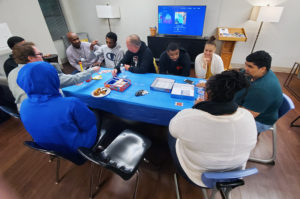Two Grants Give Elon Homes’ Foster Care Village Needed Boost

Regular meetings with volunteer mentors and staff are beneficial to the residents of Foster Care Village.
Two Charlotte, N.C., philanthropic organizations recently gave UCC-related Elon Homes a much needed gift of support. The Duke Endowment, which strengthens communities in North Carolina and South Carolina by nurturing children, promoting health, educating minds and enriching spirits, awarded Elon’s Foster Care Village a grant of $100,000. Similarly, the Merancas Foundation awarded Foster Care Village $50,000. The Merancas Foundation supports nonprofit organizations that provide food, shelter, safety, and health care to the area’s at risk community; improve academic achievement for children; and enable economic independence for adults.
Elon Homes opened Foster Care Village (FCV) on the campus of partner Johnson C. Smith University in 2017 to serve North Carolina youth and young adults aging out of the foster care system. “We are honored, and humbled, to receive these two grants from our wonderful philanthropic partners,” says Fred Grosse, president of Elon Homes. “Each of these foundations has a stringent review process. So in addition to receipt of these generous grants, we also are proud to have been successful in the review process for these respective funds.”
The new grants will be used for operations at Foster Care Village. The grants will help offset the difference between the actual cost of care, which is higher than the government reimbursement rates.
Foster Care Village serves young adults age 17-21 across North Carolina. In May 2017, phase one — the men’s dorm — opened. In March 2019, the women’s building opened. Staff members use the Transition to Independence Process (TIP) Model in structuring the FCV program. TIP, an evidence-based model that uses a positive development approach, has been demonstrated to provide a pathway for young adults to employment, future education, healthy living, well-being, and functioning well in community life.
“The performance of youth at the Village continues to remain on track, in the 80-90 percent area,” Grosse says. The high success rate shows that the youth are appropriately screened for the program and area serious about working in the program, he adds.
As FCV enters its third full year, Grosse anticipates continued success. “This will be the first year we will not have any capital improvement needs or start-up activities,” he says. “This is our first year to ‘simply’ operate the program as it is designed. Without question, Foster Care Village is changing the lives of some of our North Carolina youth.”
Join Our Mailing LIst
Follow on Facebook
Iredell Adult Day Services Hosts Ribbon-Cutting to Celebrate Adult Day Health Certification - CHHSM
www.chhsm.org
Iredell Adult Day Services (IADS) in Newton, N.C. — a nonprofit organization dedicated to caring for older adults, vulnerable groups, and their families, and part of EveryAge — hosted a ribbon cut...